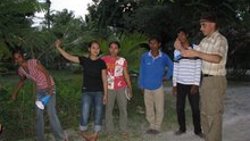For the next week, classes became more formal, something I had not actually intended. What I had expected was for everybody to be mucking about excitedly. Each student wrote down one question they would like to ask, and the class themselves whittled down the choices from 17 to the five most practical questions that everybody felt they could answer.
For a time I hoped that everything would fall into place and my concern was that I was cramming in too many things in such a short space of time, gambling on the project being short and sweet.
In the days leading up to the interview, I eventually settled on I Like My English Grilled.
For the big day, nobody volunteered to be interviewed first, so using my knowledge of democratic principles, I undertook the most random and transparent system possible: numbering pieces of paper from 1 to 20, throwing them into a hat and then getting everybody to take a piece of paper each. Afterwards, I produced a bag full of pre-marked table tennis balls marked with the same numerical scale, and indicated that whoever had their number drawn would be interviewed.
As a nail-biting exercise, I made the whole process as theatrical as possible, twirling and tossing a plastic bag full of numbered orange balls into the air several times and saying the “winning” number in an excruciatingly slow manner.
Suspense is a wonderful weapon to keep everybody on their toes.
As I fired off questions to the initial students, a few participants seemed shell-shocked. They gazed into the lens, unable to remember anything. It was like watching Bambi in a spotlight.
“What are your hobbies?” I asked one student who looked as if he had been showered by a stun gun.
“I’m fine, thank you,” came the reply. Immediately, my thoughts turned to the possibility of this project being a flop as well.
I repeated the question, and the student clasped his hands tightly and looked down to the dirt ground instead of into the lens. His attention span and interest levels were decreasing. I really did not want any outside interference or Khmer translations from a classmate, but this guy simply felt uncomfortable. I stopped recording and permitted a classmate to tell him what my question was.
At first I thought nobody would like the questions, and having tried to make them as simple as possible, I closed my eyes and imagined everything falling in a heap again.
There were many things I really wanted to hear from the students. What did they love most about Cambodia? Where in the world did they want to visit? What were their ambitions? What special talent did they have? Could they sing, dance or play an instrument? Students told me that they wanted to be lawyers, business owners and guides; they wanted to visit France, Australia and the USA but most importantly, were eager to explore Cambodia. This would be something special for students who had rarely ventured outside of their own village. Equally as impressive were the students who expressed modest ambitions to simply be healthy and happy. However, the best answer for my question relating to ambitions came from one individual who simply said, “I want my own plane.”
Participants re-told experiences of their families candidly. One student told of how he grew up in a house where his father, a rice farmer, would always come home drunk. Another revealed that his father died from a HIV/AIDS related complication and that his mother was working at a nearby village where a facility cared for children and teenagers who were either HIV positive or who had lost parents and relatives to the illness. A third shared her experience of hardship off-camera that typified the plight of many local rice farmers, one that proved almost fatal. The previous wet season, which usually begins in June, began two months later than expected. The rice crop planting and harvesting cycle was affected so severely, her entire family faced the real possibility of having no rice for the coming year.
If only my focus was a shock-valued current affairs type of program, the emotional value of hearing such a story would have made worthy viewing. But what is the price of preserving one’s dignity?
As I sought to discover more about my students, a picture was slowly unravelling. The grim reality of hardship in rural Cambodia, a truth often overlooked by travellers rushing between seeing Phnom Penh’s sites, the Angkor Wat and Sihanoukville’s picturesque beaches.
In the end, the most gratifying sight turned out to be 20 students anxiously surrounding a laptop computer at 10pm in a candlelit room. They sat together laughing, girls linking arms with each other and boys pretending that they were famous movie stars. Should any of them become famous, I hope they recall their first screen test.







Thx for this nice article.
I agree with with your conclusion. I am going to do some research and post it here for clarity. Stay tuned and I’ll be back with the info. I made sure to bookmark the site so I’ll be able to find my way back. LOL Also, if any of you women need <a href="http://www.squidoo.com/best-ab-exercises-for-women" ab exercises for home don’t hesitate to begin immediately.
Extremely interesting blog post thanks for sharing I just added your blog to my bookmarks and will be back :) By the way this is off subject but I really like your web page layout.